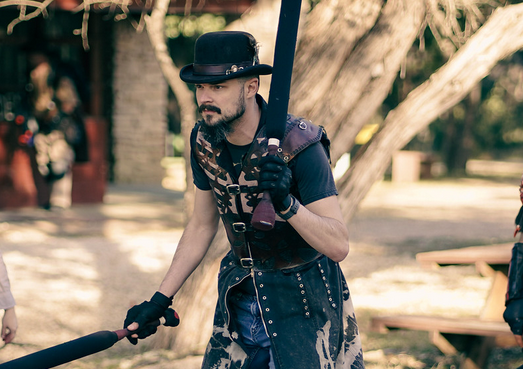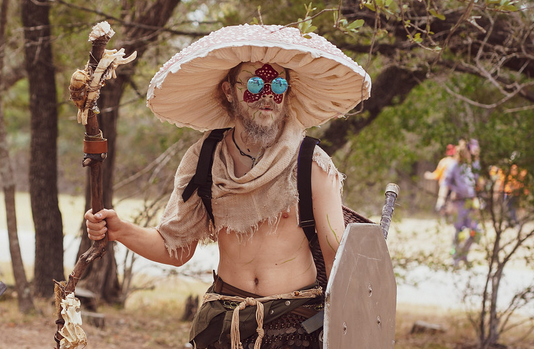Rules introduction
Dystopia Rising can be a bit complicated and confusing when it comes to the rules. While the rulebook seems big, there’s only a tiny portion of it that you need to know when it comes to playing your first event. Don’t worry — our New Player Guides are here to help, and we’ve provided a lot of resources in the New Player Corner on our website.
Let’s cover a few of the basics you might want to know:
Mind, Body, Armor, & Resolve
Dystopia Rising uses the honor system when we track how much damage you can take or how many times you can use a cool skill. You can write down a list of what you’ve done on the back of your character sheet, and our New Player Guides will walk you through this process at the game.
Keep track of how much Mind and Body you have left, so you can know when you can no longer use a Skill, or when you fall down bleeding to death.
Body is only restored by someone using a healing Skill on you, eating a meal or using a brew, or taking advantage of a few areas of the game called a “Zone of Mechanics”. These will be marked on a yellow piece of paper and explain a few rules that apply to the nearby area.
Armor is like a separate pool of Body that is lost first. However, this is only restored by someone using the Artisan skill on your gear. Armor can be great for new players, as it can be an easy way to take a few more hits in combat!
Mind is restored at noon and midnight during the game, but you can also regain it in a number of ways with Lineage advantages, meals, and brews.
Resolve does not replenish until the next event. Once you’ve spent all of your Resolve, you’ll get exhausted and suffer a breakdown called a “Fracture”. Try to save your last Resolve to avoid this!
Combat
Dystopia Rising uses a lightest touch system for combat, where we swing padded weapons (called boffers), scoring a hit when we make contact with our opponent. We’ll demonstrate this when you arrive, but here are a couple of key terms we’ll teach you:
3-Hit Flurry
When you attack, you can take up to three 90-degree swings before you have to pause. Each swing has to travel a full 90-degree arc before making contact, and can’t hit the face, head, or groin. If the swing hits a weapon or shield before making contact, it’s considered blocked and does no damage. You need to vary where you hit with each strike so you aren’t hitting the same place three times.
Damage
When you hit someone, or get hit, you take 2 points of damage from a melee strike, or 5 points of damage from a ranged attack. An exception to this rule: if someone calls out a number with a successful attack, you take damage equal to the number called.
Packets
Dystopia Rising uses three main kinds of packets. Packets are generally made of bird seed wrapped in colored cloth and sealed with a tie or rubber band. Red packets represent bullets (as do foam darts fired from blaster weapons). These cause 5 damage if they hit a person, their weapon, or shield. A weapon that uses red packets can only fire six shots before you have to role-play reloading it for five seconds. White packets represent psionic energy and are used to attack with special abilities. The ability functions if they hit a person or anything they carry. Blue packets are used to represent Arrows and work mostly like red packets except they can’t penetrate shields.
stealth
You might see a person with their arm raised in front of them as if raising a cloak. This is the symbol for “Stealth” and means that you should ignore that person unless you have a Skill called Awareness. Just pretend they aren’t there, and try your best to let them be sneaky.
Combat Skills
When in combat, you’ll hear people calling out various terms. Here’s a list of some of the more common ones:
Area of Effect or By My Voice - If you hear “area of effect,” every character within 10 feet of the individual who made the call suffers the effect (i.e. “area of effect, 10 body”). “By my voice” is similar, but it affects everyone within 50 feet.
Avoid or Defend - If you hear the words “avoid” or “defend,” it means the character who was just hit ignores the strike, and any associated effects. Avoid is a skill you can learn, Defend is a more limited skill used by non-player characters.
Bane - If you hear this call, it’s typically with a number before it, as well as a type of character (i.e. “10 zed bane”). The strike does double damage to that type of creature.
Blinding - When you’re hit by an effect that does “blinding” you can’t run or use any skills or items for 10 seconds. You can still walk and fight.
Break - If you hear this call, it’s typically with a word after it (i.e. “break weapon”). The strike renders the item it hits unusable until it is repaired.
Body - If you hear this call, it’s typically with a number before it (i.e. “10 body”). The strike does that amount of damage, ignoring armor.
Line of Sight - A call that lets someone target an individual within 50 feet without making an attack or throwing a packet.
Mangle - When you’re hit in a limb by an effect that does “mangle,” that limb becomes unusable for one hour. If you’re hit from behind with a mangle, you can’t avoid it.
Murder - If you hear this call, it’s typically with a number before it (i.e. “10 murder”). If the strike reduces you 0 body, you skip bleed out and die immediately (see below).
Stun or Takedown - When you’re hit by an effect that does “stun” or “takedown” you must take a knee for five seconds. You can’t move, fight, or use skills or items during that time.
Death and Dying
When you reach zero Body, you enter Bleed Out. All you can do during bleed out is lie on the ground and call for help (although some specific items may be used). If you’re not healed or stabilized within 5 minutes, you die. Lay still on the ground for 10 minutes, then put up the out-of-game sign and go to Ops… we have a special scene in store for you.
If someone saves you by healing you for at least 1 body, you can get up and act normally. If someone “stabilizes” you, you’re no longer dying, but can’t do anything other than walk around… you can’t fight, run or use skills or items. If you’re hit for any damage while stabilized, you enter bleed out again.
Remember: dying in Dystopia Rising isn’t the end of your character, and can be one of the most fun experiences you can have!
Out of Game Signals
Normally, Dystopia Rising is a 24/7 full immersion experience: everyone will be acting in character the entire time. At various points during the weekend, you might want to talk to people out-of-game, or not be in character. When you do, you can put your fist or your boffer to your head; this is the “out-of-game” signal. Our other out-of-game signal are green headbands. If you see someone with a green headband, they are out-of-game.
When you’re out-of-game, it’s important to not talk around people who are still playing, unless you need to approach them with an out-of-game concern. Remember, people are more important than games! If you need help, have a question, or need to leave a scene, don’t hesitate to go out-of-game. You can also leave any scene or encounter at any time, without repercussions by going out-of-game, and head to operations for assistance.
We do use one specific out-of-game mechanic for player safety: the OK Check-In. If someone makes the “OK” hand gesture at you, they’re asking if you - the player - is okay. In character, you might be angry or crying, but the person making the OK gesture is checking to see if the player is okay. If someone makes the OK gesture at you, you have three options":
Thumbs Up - If you’re OK, then give them the thumbs up. This lets them know it’s okay to continue roleplay.
Thumbs Down - If you’re not okay, give them the thumbs down. They’ll know to stop role-playing with you, and go get help.
Wavering Palm - Sometimes you’re not sure, in which case give them an open, level palm. They’ll still back off and make sure you get some help, but it’s less urgent than a thumbs down.




